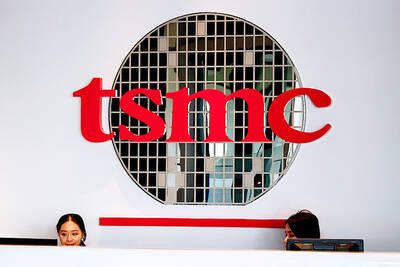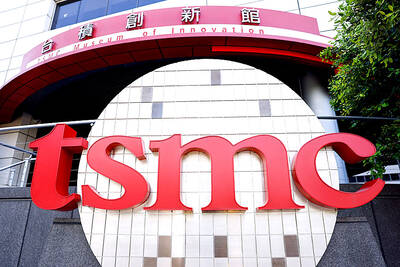Taiwan High Speed Rail Corp (THSRC, 台灣高鐵) managed to narrow its losses to NT$2.7 billion (US$82.3 million) in the first half thanks to lower overhead costs, the company said yesterday.
The debt-ridden company, which has been hit by a slump in demand amid the economic downturn, trimmed its net loss by 75 percent to NT$2.7 billion compared with NT$11 billion for the same period last year.
THSRC spokesman Ted Chia (賈先德) attributed the improvement to a recovery in the number of passengers, lower interest rates and changes to the company’s accounting rules.
Despite the downturn, passenger ticket revenue totaled NT$11.5 billion in the first half, up from NT$10.8 billion last year, after the company introduced a series of discounts that cover 81.2 percent of its trains, the data showed.
The central bank’s relaxed monetary policy helped lower the company’s borrowing costs, with interest dropping to NT$5.5 billion in the first half from NT$8.1 billion last year, Chia said.
The spokesman said the company is seeking to cut its expenses further as its interest rates remain relatively high at between 2.6 percent and 2.8 percent. The rate stood at about 4 percent for part of the loan last year, from 8 percent a year earlier, Chia said.
In addition, Chia said THSRC abandoned the straight-line method in favor of a different formula for writing off depreciation costs, which fell to NT$4.07 billion in the first six months from NT$9.45 billion a year earlier.
Under the new method, depreciation costs pick up modestly in the short run but surge sharply in the long run, Chia said, adding that the company is seeking government approval for dividing the expenses over a longer period.
The summer saw mixed results, with the number of passengers rising to 2.95 million in July from 2.81 million last year, but dropping sizably last month, when the company suspended operations for two days because of Typhoon Morakot, Chai said.
“The storm must have dented revenues, although final figures are not available yet,” he said, adding that passengers averaged 90,000 a day.
Eric Lai (賴建承), an analyst at Marbo Securities Consultant Co (萬寶證券投顧), said THSRC expected to report further improvement in the second half as companies and individuals spend more on travel amid a recovery in the economy.
However, Lai said a dramatic improvement was unlikely based on the company’s financial records.
Despite its improved finances, THSRC has more than NT$70 billion in accumulated losses, representing 67 percent of the company’s capital.
Chai said the company’s refinancing plan had made no headway as banks kept calling for a capital injection — an idea that the company has dismissed as impractical.

Chizuko Kimura has become the first female sushi chef in the world to win a Michelin star, fulfilling a promise she made to her dying husband to continue his legacy. The 54-year-old Japanese chef regained the Michelin star her late husband, Shunei Kimura, won three years ago for their Sushi Shunei restaurant in Paris. For Shunei Kimura, the star was a dream come true. However, the joy was short-lived. He died from cancer just three months later in June 2022. He was 65. The following year, the restaurant in the heart of Montmartre lost its star rating. Chizuko Kimura insisted that the new star is still down

While China’s leaders use their economic and political might to fight US President Donald Trump’s trade war “to the end,” its army of social media soldiers are embarking on a more humorous campaign online. Trump’s tariff blitz has seen Washington and Beijing impose eye-watering duties on imports from the other, fanning a standoff between the economic superpowers that has sparked global recession fears and sent markets into a tailspin. Trump says his policy is a response to years of being “ripped off” by other countries and aims to bring manufacturing to the US, forcing companies to employ US workers. However, China’s online warriors

Taiwan Semiconductor Manufacturing Co (TSMC, 台積電) listed the challenges of ensuring export control compliance by its customers, months after the company’s artificial intelligence (AI) silicon was found to have flowed to US-sanctioned Huawei Technologies Co (華為) via intermediaries. “TSMC’s role in the semiconductor supply chain inherently limits its visibility and information available to it regarding the downstream use or user of final products that incorporate semiconductors manufactured by it,” the Hsinchu-based company said in its latest annual report released on Friday. The world’s largest contract chipmaker said the constraint impedes its ability to prevent unintended end-uses of its semiconductors, as well

Taiwan Semiconductor Manufacturing Co (TSMC, 台積電) expects steady growth this year despite global economic uncertainty due to continued momentum from tech trends such as 5G, artificial intelligence (AI) and high-performance computing (HPC) applications. In the company’s annual shareholders’ report released on Thursday, TSMC chairman and CEO C.C. Wei (魏哲家) said the company is well-positioned to meet market demand with its differentiated technology platforms. The company’s 2-nanometer process is on track for volume production in the second half of this year, while its next-generation nanosheet-based A16 process, aimed at HPC applications, is scheduled for mass production late next year, Wei said. Advanced technologies —